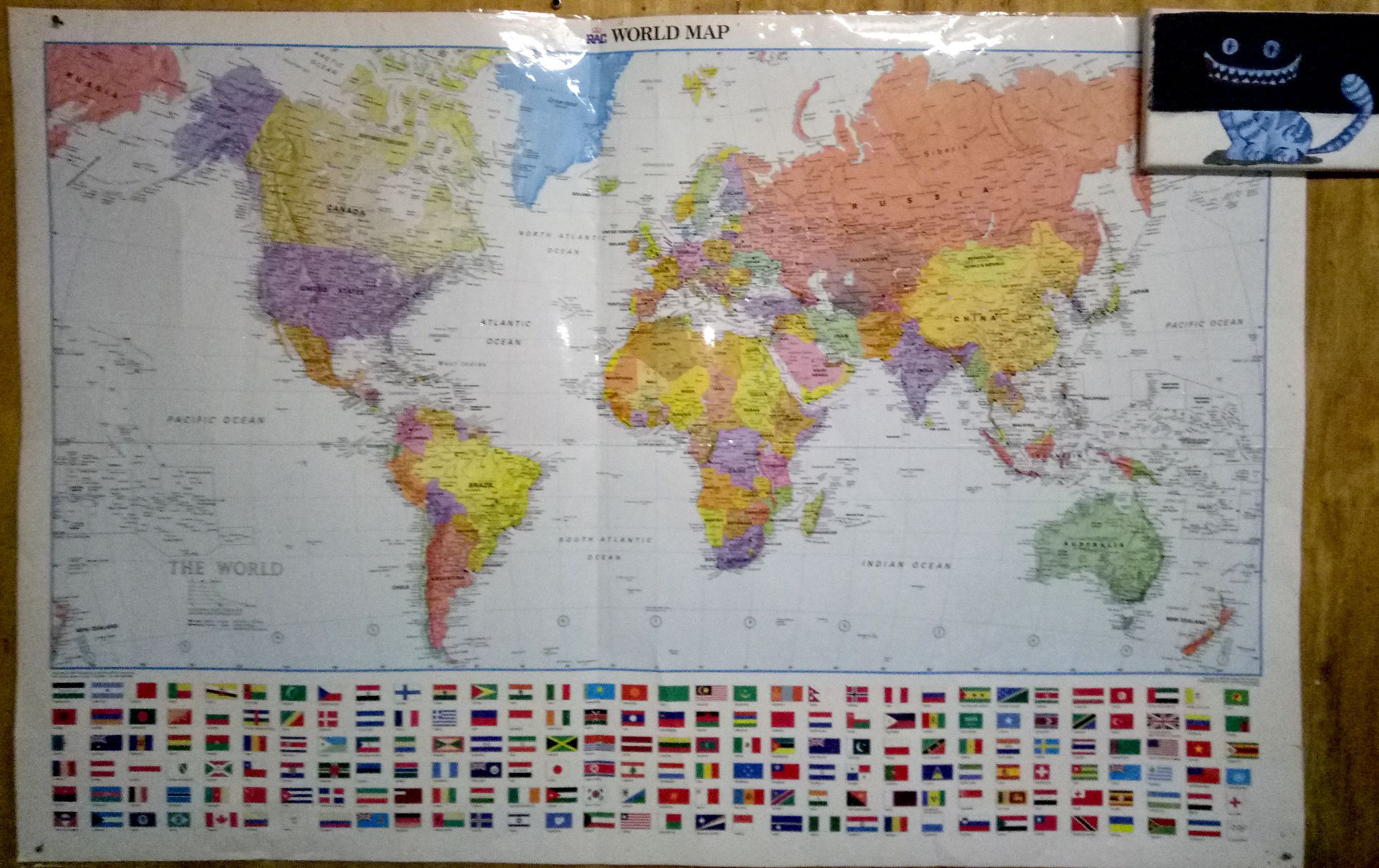Language blog #001 or : How and Why I am trying to learn 6 Languages at once
"If your going to fall, do it from the greatest height" When you need a good opening quote you can either look one up or make one up, I did the latter, It does however seem pertinent.
Why am I trying to learn 6 languages at once?
A quick summary:
I guess I like to try things the hard way. Failure is always an option, but you wont know if you don't try. In fact I have attempted to learn(with varying degrees of effort) all of these languages at some point in my life. It would seem to make sense to focus on one language, perfect it and then move on. I have had language classes in school, attended adult learning centers, purchased books and software programs all with honestly very little success.
There are two types of learners in this world, those who learn by pure memory recall commonly known as 'parrot fashion' (this actually comprises the majority of people) and those who learn by fundamental understanding. Pure memory recall is much faster, in the beginning and is good for things like passing tests, or in relation to language learning, doing a one off translation. Without context though, all those links between the neurons in the brain will disappear just as quickly as they formed and the memories are lost. Understanding not just one, but all language, and the idea behind how and why we communicate may seem overwhelming in the beginning, but like solving a 10000 piece jigsaw puzzle, once you start to get a good foundation, eventually all the rest of the picture starts to just fall into place.
Learning other languages opens up a couple of things, when traveling it allows you to greater interact with the locals and get the most out of the travel experience. It also allows a much greater ability to learn things. There is so much information in the world and ideas that defy translation. There are entire libraries of book, in many many countries not written in English, and I would like to be able to read them. There are people with stories that I want to listen to and there are places with cheap drinks that I want to sit in and watch the world float on by.
The 6 languages that I am going to try and learn at once are
Japanese
Korean
Indonesian
Spanish
German
French
There are a few reasons for learning these in particular. Now the list is in no particular order for the same reason that there are 6 on it. Lets go back to the beginning, year 4 of primary school (not sure what they call it in the rest of the world but I would have been about 9 or 10 years old) I learned my very first words in German. Language lessons were not particularly regular, and at that age I didn't really understand the point of anything in school, I merely went and learned things because that's just what you did. Skip ahead to year 8, change schools and now I have French lessons. I did French for 2 years and it comprises the largest amount of foreign vocabulary that I have. Incidentally when ever I try and think of a word I don't know in say Spanish, if I know the French word, then that will pop into my head instead.(Not a very useful skill to have). I regret not learning more French in high school, but I dropped the classes to do advanced computing (advanced for the late 90's anyway :) I've been watching Anime since 1995 (Neon genesis Evangelion, my first and still my favorite) Which obviously leads to my interest in Japanese.

By the time I finally got myself a passport at age 35, I had given up on ever visiting Japan, due to having an indictable offence( that's a long story for a different time) listed on my record, I would not meet the Visa requirements. It may seem a little silly, but I wanted to visit Japan so much, (I hope this doesn't offend anyone)that my initial reason for wanting to learn Korean is that Korea seemed the 'next closest thing' and with different visa requirements means its was no problem. This of course started a journey of discovery into Korean culture(OMG how good is kimchi) and it now has its own special place in my heart. As is often the case in this world, Japan and Australia have updated their visa agreement and I can now possibly visit there as well.
Once I actually had a passport, I started learning Spanish. This was after a long debate on which language would be most useful to me in the world as well as being relative to places I intend to go(If the country speak Spanish, chances are I want to go there). I also had a friend at the time who was willing to learn with me, so I would be able to practice (that's the theory anyway, didn't quite turn out that way).
Finally Indonesian, this may seem an odd choice for the list, but it is there for a few very good reasons. My first ever trip overseas was to Bali, and before I left the amount of Indonesian words I knew was zero. I was there for 10 days and I learned a handful of words which greatly improved my experience. I don't do 'tourist' stuff when I travel, I spent most of my time sitting on the beach talking to some locals I made good friends with. I chose Bali as my first overseas trip because it is a tourist hotspot (a bit contradictory it seems, but trust me) this meant most of the locals know English and as a beginner destination I learned a lot about traveling without being too far outside my initial comfort zone. Bali also happens to be the single cheapest place one the planet for me to fly too. This means for any and all future overseas trips, it cost no extra to stopover in Bali say hi to my friends and actually practice the language I am learning. There are a few other reasons for wanting to know Indonesian , but they can wait.
I have decided to keep learning French and German as well because English itself being of Latin/Germanic/a bit of everything origin, I made the discovery of how our Languages are all somewhat intertwined. I also intend on visiting these countries. (If you haven't guessed by now, given suitable funding I would happily spend my entire life a nomad traveling the world and meeting locals, I'm not particularly attached to the idea of staying in one place)
The problem
Children learn language through immersion and they learn the words they need, in order, as their life progresses(Fundamental learning method). Most languages are taught however the same way as any other subject, repetition. Every course starts the same way, learn how to introduce your self, learn how to order food or ask where the train station is. Unless your actually traveling at the time, these memorised phrases are basically useless. All of the material I have available to practice with, Anime, Pop songs, Local news, random backpackers you meet at a music festival somewhere out in the bush etc usually have completely different vocabulary than what is taught at 'for fun and travel' classes. Often it is also the formal version of the language that is taught, so listening to native speakers in everyday situations doesn't help.
I have tried many methods and for me at least they (maybe it's just me) all performed quite poorly.

The solution
So back to the drawing board, after researching how most people successfully (there are a lot of unsuccessful learners with bad advice out there) learn language, I devised a plan that should work for me. So it goes a little something like this. Learn like a child. First up I looked into what words we learn as children and in what order. Despite having a very limited vocabulary most toddlers do a reasonable job of making themselves understood. I don't ever recall being 5 years old and not being able to communicate because I didn't know words, I got along just fine with what I had at the time. If I could travel the world with the equivalent speech of a 5 year old I'm sure I could get by just fine. Getting to this level of simple sentences is the ultimate goal. From here learning just becomes a matter of practice and immersion. (The puzzle pieces fall into place)
Neurolinguistic programming anyone?
As much as I say pure memory is not the way to learn, we have to expand our vocabulary somehow, so the first goal is to learn our first 10, then 100, 200 words until we have about 1000 total. By learning multiple languages at once, these neural pathways are reinforced. The brain known its in 'learning mode' and writing 10 words in a day is a pretty simple task. Repeating it 6 times is honestly not much more effort. Now each language has its own unique traits, but what you learn about one language can help you 'learn how to learn' another. Take the simple task of remembering someones name as an example. If I meet a new person named 'Cosmo' and I don't already know someone with that name, Cosmo is unique after all, then my brain will store the name 'Cosmo' but it will also link it to what I know about the person, what they look like, the fact they have a unique name, any other unique facts about the person. Now if I meet a second person called Cosmo, or Bill, or James or any name already on my brains internal list, the person says "Hi my name is Cosmo" and my brain goes yeah, I know that name, that word is in my list of names I know and zero new memories are formed. This is why it becomes very difficult to remember peoples names, because you already know the name, its the connection in your brain that your trying to establish. So now when I learn a new word, I am making 6 new connections to that same word. (more about this in the next blog)
What about proper grammar?
My single biggest annoyance when trying to learn from existing literature is they translate grammar. Take the Japanese sentence "Inu wa dore desu ka" The translated version would be something like "which one is a dog?"
If you don't know, try and figure out which word means dog? The much more literal translation would be "Dog (speaking of) which one is question" I find the literal translation much easier to understand (and now we easily know that inu means dog) and once you read a few sentences like this, the grammar rules almost wright themselves. I guess also because English has such obtuse (just wanted to use the word obtuse :) grammar rules, that I personally find it very easy to adapt to alternate word orders and rules. The initial goal here is also learn the language of children, where proper grammar will come later. I do actually have a simple plan for learning grammar as well, but we wont need that for a while yet.
If anyone feels like learning along with me, I have decided to start blogging what I am actually learning as well. This will give me more practice writing, purely from having to write the blog posts, and exposure to more of the wonderful international audience we have here on Steemit.
Looks like I have to install some language packs so I can input in the correct characters( It's all been pencil and paper so far), so I will end today with just the list of 'First words' in English only today.
First ten words
(We all know a child's first word is MUM, but I have slightly tailored the list as I don't foresee myself needing to say mum in 6 other languages. I'm pretty sure my mum already understands me :) The word for 'mother' comes later)
More
Please
Thanks
Hello
Bye
Again
Sorry
Yes
Okay
No
For what comes next and all the translations stay tuned for the next language blog.
World Map Title image : Me
Neon Genesis cover image : Amazon
Baby Duck : Found it on the interwebs
Thanks for reading.

Wow, c'est un super objectif! Les langues ouvrent tellement de portes!
Alles Gute und viel Spass beim Lernen!
merci
I don’t know if I enter in the category unsuccessful learners with bad advice, but what it helped me was listening to music and translating the lyrics, watching series in English with English subtitles, reading and searching for the words I didn’t understand, with time the unknown words were less. Also lately I’m not translating words that are new, I moved to searching the words’ meaning in a dictionary, I guess it’s part of the process of thinking in the language.
All this language conversation has motivated me to start German and French again :)
So, here are the words you said in English, Spanish, German and French (just the ones I know):
More – Más – Mehr.
Please – Por favor – Bitte - S'il vous plait.
Thanks – Gracias – Danke – Merci.
Hello – Hola – Hallo – Bonjour.
Bye – Adios - Auf Wiedersehen – Adieu.
Again – Otra vez.
Sorry – Lo siento / Disculpa / Perdón – Traurig – Pardon.
Yes – Sí – Ja – Oui.
Okay – Isn’t okay universal?
No – No – Nein – Non.
And thank you for the baby duck, they are always appreciated :)
Buena suerte aprendiendo todos estos nuevos idiomas y alcanzando tus metas.
Translating music lyrics and watching subtitled series is my main method of immersion(until I start traveling again). I always preferred subtitled movies to dubbed ones. I had not yet come across 'Disculpa' only Lo siento, already learning something new :) The reason for having okay in the list is to differentiate between to formal and informal ways of saying yes. It also takes some experimentation with google translate to find words, for example google translates YES as 'si', OK as 'De acuerdo' and OKAY as 'bueno'
similar issues translating thanks vs thankyou. This is one of the things I have learned as a result of translating multiple languages at once, don't trust google :) as always gracias por el apoyo
I always wondered a few things with Ok/Okay. In Spanish we commonly use it as "ok" and it's to agree in something, like saying "de acuerdo" (agree), but in English is used as "okay" and it's to agree with something and also when someone asks you how are you, you can reply with okay as fine.
As for the story behind the word, once (when I didn’t want to know everything) I read that O.K. came to existence because during war times if the trope came back to the base without any death they wrote on a board 0.K. meaning 0 Kills, this morning I decided to check and… IT WAS ALL LIES!!! I lived in ignorance for many years!!! Good that I never repeated that information to someone else.
And yes, you are right, don't trust in Google, it lies.
De nada ¡Siempre a la orden! :)
Indonesian uses Bahasa Melayu (Malay Language).
I would say it's one of the easiest languages to be learned in your list. Do come to Malaysia too after you mastered your Malay Language :D
According to my perception, I arranged the Easiest to hardest language to be learned.
Malay, Japanese, Korean, Spanish, French, German
I was unaware until now that Indonesia was a standardized version of Malay. This makes me very happy, there will be even more places for me to visit and practice. I will definitely be visiting Malaysia in the future, I consider myself quite lucky that all these Southeast Asian countries are so accessible.
Terima kasih.